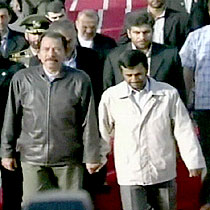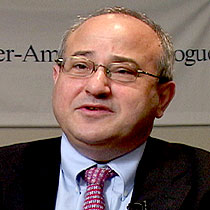2007年VOA标准英语-Nicaragua Welcomes Iranian Aid
搜索关注在线英语听力室公众号:tingroom,领取免费英语资料大礼包。
(单词翻译)
By Bill RodgersWashington
09 August 2007
Iran has pledged tens of millions of dollars in aid for infrastructure1 projects in Nicaragua in a move viewed with alarm in some quarters. Nicaraguan President Daniel Ortega, who was a Cold War nemesis2 for Washington in the 1980s, is seeking closer ties with countries the Bush administration considers unfriendly -- while Tehran is looking for allies in Latin America. More from VOA's Bill Rodgers.
 |
| Presidents Ortega and Ahmadinejad |
But the world has changed, and since Mr. Ortega's inauguration4 in January as president, relations between Washington and Managua have been cordial.
Yet the Nicaraguan leader is also working to deepen ties with Cuba, Venezuela and now Iran -- all nations at odds5 with the United States.
This alarms some, including former U.S. Assistant Secretary of State, Roger Noriega of the American Enterprise Institute. "You really have to go out of your way to reach out to one of the four biggest rogue6 states in the world, Iran, which is recognized as a pariah7 by all the respectable countries of the world,” says Noriega. “So unfortunately, President Ortega seems to be going back to the past."
President Ortega visited Tehran in June, where he was warmly welcomed by President Mahmoud Ahmadinejad. For his part, the Iranian leader is using his country's oil wealth to court allies in Latin America, according to Michael Shifter, an expert on Latin America at the Inter-American Dialogue in Washington.
 |
| Michael Shifter |
This apparently8 was the objective of President Ahmadinejad's trip to Latin America in January, where his first stop was Venezuela. There, he and Venezuelan leader Hugo Chavez cemented their relationship, bound together by their mutual9 antagonism10 toward Washington. Mr. Ahmadinejad also stopped in Nicaragua during that trip, a visit that laid the groundwork for Iran's assistance to the Central American nation.
While the aid is expected to further deepen ties between Managua and Tehran, the announcement from Managua prompted a relatively11 mild reaction by U.S. State Department spokesman, Sean McCormack.
"Nicaragua is a sovereign, independent state. It's going to have bilateral12 relations with whatever states it sees fit to have relations with. We think it is in the interests of Nicaragua, as well as other states in the region, to deepen its relationships with those states which have a positive vision of the future in terms of Nicaragua's democracy, expanding that democracy, deepening that democracy," McCormack said
For Mr. Ortega, who won last November's presidential election on promises of political moderation, aid from Iran and Venezuela is a welcome boost to his government.
Yet he also is well aware these ties do not please Washington, according to Michael Shifter. "Ortega has changed somewhat but he is still somebody who ideologically13, I think, does have a lot of resentment14 towards the United States and I do think he wants to be empowered but at the same time, its important to remember he is not breaking with the United States."
But as one of the poorest countries in the Western Hemisphere, most Nicaraguans are likely to welcome the aid -- whatever the source.
 收听单词发音
收听单词发音 




